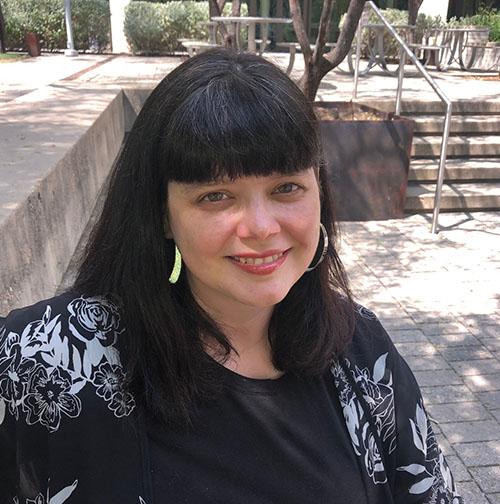Moody Faculty Spotlight: Emily Quigley
Emily Quigley

We specialize in writing for undergraduate communication majors. Our writing coaches have been through the courses that students are taking and understand the nuanced language of the discipline – as screenwriters, journalists, speech therapists, advertisers, and public relations professionals.
When students come in for appointments, I acknowledge that even those with strong foundational writing skills might not understand how to write as a communications professional.
I tell them, “It’s almost like learning a different language.” Our program provides an extra layer of specialized writing support to support their skills as emerging communication professionals.
How do the students hear about the opportunities for writing support?
We actively seek to ensure Moody undergraduate students know we are here to help. We communicate with faculty of writing flag courses to partner on class visits or workshops. Some faculty make getting writing support a part of their curriculum by offering extra credit or making a visit part of their written assignments.
The Writing Support Program is featured in messaging on Moody College monitors. We also have student coaches who develop our social media presence. Our team participates in Moody events to provide in-person opportunities to get more information about our services.
Our location on the third floor of the DMC building in the middle of the office spaces is easy to access and identified with a large poster. Additionally, we have adapted effective online practices to create opportunities for virtual visits that fit busy student schedules.
What can instructors learn from the process of coaching in the writing support program?
One thing that I do as a writing coach and instructor is to think about how I can tweak a message to reach different learners. I craft feedback that is specific to the learner’s identified needs. Having a common language to discuss writing is important. Sometimes, I need to define terms to ensure that I am communicating effectively about the writing process. For example, I had an incident where I was using the term attribution. When it seemed the student was confused, I realized that I had to explain that term to clarify the revision that the student needed to make. I have to remind myself that “what makes sense to me does not make sense to everyone else.”
What would you like faculty members to know about the program?
I would like to make sure that people know we are here for individual referrals for struggling writers or whole class support. We have the materials and resources to build student skills.
Students often come into an appointment nervous. Working with a peer one-on-one can help ease that pressure, and we always have candy at the desk to set a relaxed atmosphere. Our student writing coaches have passed a screening test for writing skills and are competent writers. More importantly, we select coaches who are kind, friendly, and approachable to build student confidence.

